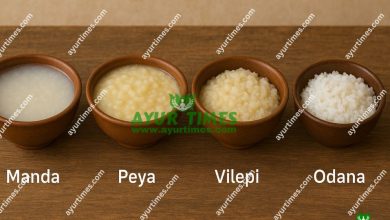White Tongue in Ayurveda: Causes, Signs, and Remedies
A white-coated tongue may seem like a minor issue, but in Ayurveda, it is a major diagnostic sign. The tongue acts as a mirror of digestion, and when coated white, it is often an indication of the presence of ama—the toxic by-product of poor digestion. Ayurveda views this as a warning that the body is struggling with digestion and internal cleansing.
What is Ama?
Ama is a Sanskrit term meaning “undigested” or “uncooked”. It is the sticky, foul-smelling substance that results when digestion is weak or incomplete. Ama accumulates in the digestive tract first, and over time, it may spread throughout the body, leading to disease.
Ayurvedic Tongue Diagnosis: What a White Coated Tongue Reveals
| Tongue Appearance | Ayurvedic Meaning | Underlying Issue |
|---|---|---|
| White, thick coating (especially morning) | Accumulation of ama | Weak digestive fire (Mandagni) |
| White coating mostly at the back | Toxins in colon/intestines | Vata imbalance and sluggish digestion |
| Dry white patches | Dehydration, Vata dryness | Poor fluid absorption |
| Moist and thick white layer | Kapha dominance | Excess mucus, congestion, and stagnation |
Role of Agni (Digestive Fire)
According to Ayurveda, Agni is the biological fire responsible for digestion, absorption, and assimilation of food. When Agni is low (Mandagni), food remains undigested and ferments, leading to ama.
| Agni Type | Description | Effect on Tongue |
|---|---|---|
| Samagni (Balanced) | Balanced digestion | Clean tongue, pink and moist |
| Mandagni (Low) | Slow digestion | White tongue with coating |
| Tikshnagni (Sharp) | Excess heat, hyperacidity | Yellowish coating |
| Vishamagni (Irregular) | Erratic digestion | Uneven white or dry patches |
Dosha Involvement in White Tongue
| Dosha | Contribution to White Tongue | Associated Signs |
|---|---|---|
| Kapha | Heavy, sticky ama buildup | Sluggishness, mucus, fogginess |
| Vata | Dry, rough white coating | Gas, bloating, dry skin |
| Pitta | Usually yellow coating | Acid reflux, inflammation |
Additional Symptoms of Ama in the Body
- Loss of appetite
- Heaviness in the abdomen
- Coated tongue, especially in the morning
- Constipation or sticky stools
- Bad breath and body odour
- Lethargy and low energy
- Frequent colds or allergies
Ayurvedic Remedies for White Tongue
- Daily Tongue Scraping (Jihwa Nirlekhan)
| Tool | Recommended Material | Why Use It |
|---|---|---|
| Tongue Scraper | Copper or stainless steel | Removes toxins, stimulates digestion |
Scrape from back to front gently after waking up, before brushing.
- Digestive Spices to Rekindle Agni
| Spice | Benefits |
|---|---|
| Ginger | Enhances digestion, clears ama |
| Cumin | Promotes nutrient absorption |
| Fennel | Reduces bloating and indigestion |
| Black Pepper | Clears mucus and stimulates metabolism |
Tip: Chew a slice of fresh ginger with lemon and salt before meals.
- Ama-Pacifying Herbs
| Herb | Action |
|---|---|
| Triphala | Detoxifies and clears bowel ama |
| Guduchi (Giloy) | Enhances immunity, clears deep-rooted toxins |
| Neem | Bitter cleanser, especially for Kapha-ama |
| Pippali | Rekindles Agni without creating excess heat |
- Warm Water Therapy
Sip warm water throughout the day to help flush toxins and improve digestion. Avoid cold drinks, as they suppress Agni and worsen ama.
- Ama-Clearing Diet
| Include | Avoid |
|---|---|
| Light, warm foods (khichdi, vegetable soups) | Dairy, fried, heavy foods |
| Cooked vegetables | Raw salads (unless digestion is strong) |
| Herbal teas (ginger, cumin-fennel) | Cold beverages |
| Small, frequent meals | Overeating or eating late at night |
Lifestyle Recommendations
| Practice | Reason |
|---|---|
| Wake before sunrise | Aligns with natural detox rhythms |
| Oil pulling with sesame oil | Pulls toxins from the mouth |
| Abhyanga (self-massage) | Stimulates lymphatic drainage |
| Yoga and Pranayama | Boosts digestion and circulation |
Conclusion
A white-coated tongue in Ayurveda is a visible sign of internal imbalance, particularly a sluggish digestive fire and accumulation of toxins (ama). Addressing it requires a combination of daily cleansing practices, dietary adjustments, and supportive herbs to restore Agni and detoxify the system. By paying attention to this simple daily sign, you can catch imbalances early and support your body’s natural healing process.

